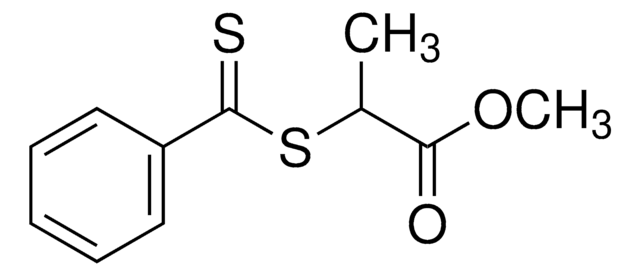모든 사진(2)
About This Item
실험식(Hill 표기법):
C7H10O4S3
CAS Number:
Molecular Weight:
254.35
MDL number:
UNSPSC 코드:
12352106
PubChem Substance ID:
NACRES:
NA.23
추천 제품
일반 설명
- A stable, trithiocarbonate chain transfer agent (CTA), also referred to as a RAFT agent, which can control chain growth in free radical polymerization producing polymers with well-defined molecular weights and low polydispersities.
- 2-(2-Carboxyethylsulfanylthiocarbonylsulfanyl)propionic acid may be used to control homo- and co-polymerization of acrylic acid, acrylates, acrylamides, styrenes, methacrylates, and methacrylamides. It is soluble in aqueous and organic media (amphiphilic).
주의사항
Storage conditions: Room temperature, protect from light.
법적 정보
Sold for research purposes only: See sigma-aldrich.com/raftlicense. Patents: WO98/01478, WO99/311444.
Storage Class Code
11 - Combustible Solids
WGK
WGK 3
Flash Point (°F)
Not applicable
Flash Point (°C)
Not applicable
이미 열람한 고객
Substituent Effects on Trithiocarbonates-Mediated Polymerization of Styrene.
Journal of Applied Polymer Science, 111, 2011-2017 (2009)
A Continuous Flow Process for the Radical Induced End Group Removal of RAFT Polymers.
Hornung H, et al.
Macromolecular Reaction Engineering, 6, 246-251 (2012)
Thermo-responsive shell cross-linked PMMA-b-P(NIPAAm-co-NAS) micelles for drug delivery.
Chang C, et al.
International Journal of Pharmaceutics, 420(2), 333-340 (2011)
Synthesis of Dual-Functional Poly(6-azidohexylmethacrylate) Brushes by a RAFT Agent Carrying Carboxylic Acid End Groups.
Cimen D, et al.
Journal of Polymer Science Part A: Polymer Chemistry, 53, 1696-1706 (2015)
Synthesis and Evaluation of New Dicarboxylic Acid Functional Trithiocarbonates: RAFT Synthesis of Telechelic Poly(n-butyl acrylate)s.
Wang R, et al.
Macromolecules, 38, 9518-9525 (2005)
문서
Low-cost, high-purity RAFT Agents are vital for industrial RAFT polymerization. We supply effective agents for this technology.
The modification of biomacromolecules, such as peptides and proteins, through the attachment of synthetic polymers has led to a new family of highly advanced biomaterials with enhanced properties.
자사의 과학자팀은 생명 과학, 재료 과학, 화학 합성, 크로마토그래피, 분석 및 기타 많은 영역을 포함한 모든 과학 분야에 경험이 있습니다..
고객지원팀으로 연락바랍니다.
![4-Cyano-4-[(dodecylsulfanylthiocarbonyl)sulfanyl]pentanoic acid 97% (HPLC)](/deepweb/assets/sigmaaldrich/product/structures/204/925/30ae6ca0-5b0b-4963-a061-7e5e3d1a85af/640/30ae6ca0-5b0b-4963-a061-7e5e3d1a85af.png)









